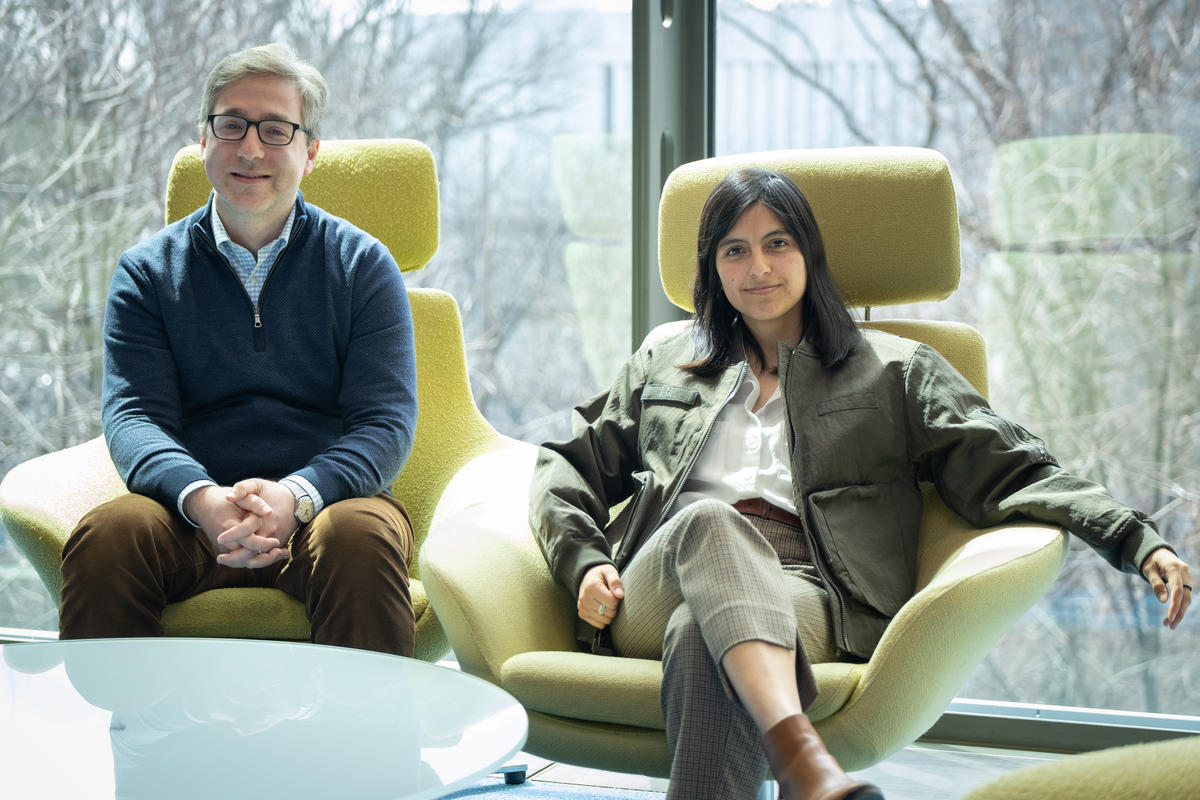Kleiner Outreach Videos Focus on DNA/RNA Science
Established chemists often point to high school chemistry as the origin of their passion for science, driven by a teacher’s ability to translate the wonders of chemistry across an indifferent classroom.
So when Assistant Professor of Chemistry Ralph Kleiner set out to tell the story of landmark discoveries in chemical biology, he kept one goal foremost in mind: make it compelling.

Photo by C. Todd Reichart
This month, the Kleiner Lab meets that goal with the completion of the first two in a series of instructional videos for high school students. Backed by the able narration of graduate student Emilia Argüello, the videos use primary literature to highlight some of chemistry’s historic achievements in nucleic acid science.
The videos are available through the Department of Chemistry’s Vimeo channel and the Kleiner Lab website. They include “The Transforming Principle” and “Discovering the Structure of DNA.” The videos were filmed by Department Design and Communication Strategist C. Todd Reichart.
Engaging and conversational as they are informative, the videos fulfill part of Kleiner’s 2019 CAREER Award. The National Science Foundation, which stewards the award, requires a strong commitment to outreach and education as part of its funding specs.
“When I was writing the CAREER proposal, I felt there has been a de-emphasis on education in nucleic acid science, maybe because a lot of key discoveries are almost ancient by now,” said Kleiner. “But in the last few years, there’s been an emergence of therapeutic modalities that are directly based upon manipulating nucleic acids; for example, the COVID vaccine.
“If you look at the discoveries that led to these therapeutics, they are grounded in foundational advances in nucleic acid science. Among them are studies of nucleic acid structure, the genetic code, protein translation, and post-transcriptional RNA regulation. There’s just so much there.”
Telling an engrossing story in which words like “genome,” “plasmid,” and “phenotypes” figure heavily is not an easy ask. But Kleiner and Argüello developed plotlines in their videos that sound like something you might hear on a good podcast. That was Argüello’s aim.
Here, for example, is her introduction to the discovery of the structure of DNA:
“What exactly is DNA and why it’s shaped like that is a really interesting story of many scientists, of many results, of neglected results. It’s a bit of a controversial story – probably one of the most in 20th century science about who got credit for what.”
Argüello, whose work in the Kleiner Lab focuses on investigating the interactions of proteins with modified RNA, was tasked with selecting, organizing, and translating the information for the first two videos.
Filmed with the Frick undergraduate laboratories as backdrop, the videos convey not only general principles but a general sense of how chemistry is done. It’s not just about opening up textbooks, said Kleiner and Argüello. It’s about reading original papers from researchers who laid down the foundation years and decades ago, and understanding how much inspiration derives from those sources.
“I’m very adamant about being conversational in my talks, even if it’s an official talk,” said Argüello. “I have to feel that I’m engaging with the audience. Some people say, I’m never going to understand chemistry; it’s too arcane, too intellectual. But no – we can unpack these concepts and have a conversation that inspires people.”
The lab plans to produce up to 10 videos on such topics as DNA replication, tRNA structure, and the elucidation of the genetic code, among others.
Noting that Argüello will finish her Ph.D. studies this spring and that a new narrator from the Kleiner Lab will take her place, Kleiner said the project will stretch over the remaining three years of his CAREER funding.
“There’s a lot of ground to cover in the past 70 years of this field,” he said. “We’ll start simple with these first two videos and build up the complexity from there.”
